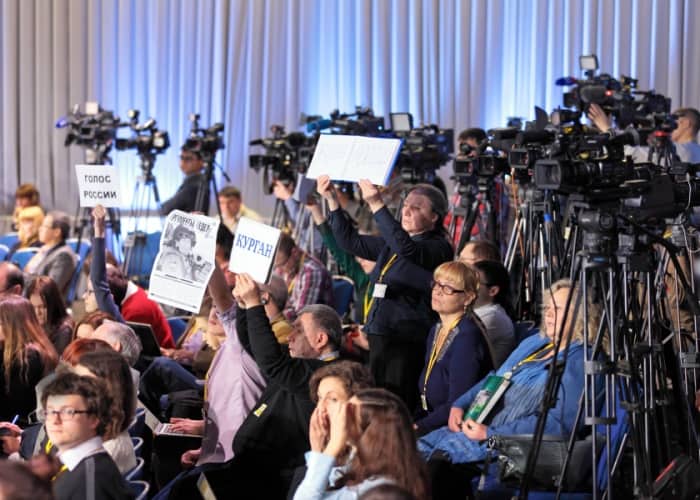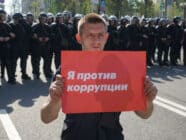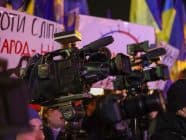
Journalists at one of Vladimir Putin’s annual press conferences in Russia. Photo by Shutterstock.
It has never been easy for independent Russian journalists. Even before Russia’s full-scale invasion of Ukraine, there were challenges. But since the war in Ukraine in February 2022, it has been harder than ever for non-governmental Russian media to keep their work going. Many journalists had to leave their home country and are now publishing from exile.
Former Russian journalist and fellow of the Erich Brost Institute for International Journalism, Zhanna Nemtsova, left her home country after her father, the opposition politician Boris Nemtsov, was allegedly killed by the Russian government. She then founded the Boris Nemtsov Foundation, which focuses on education, freedom of information, and human rights. She also organises a summer school to train young Russians who are interested in independent journalism and a democratic future for their country.
Zhanna Nemtsova spoke to EJO about the current situation facing independent Russian journalists and the goals of her summer school.
EJO: How would you describe the current situation facing independent journalists in Russia?
Zhanna Nemtsov: Independent journalism is repressed in Russia. It is banned. That’s why most independent Russian journalists are now in exile. Most independent media outlets relocated their teams to different foreign countries. It is offshore journalism. Nevertheless, lots of Russian media outlets that work in exile still have freelance journalists inside the country. Obviously, they must be very careful, and they take the security protocols seriously.
These circumstances make independent journalistic work incredibly difficult. Since Russia is more and more isolated it is challenging for journalists to actually keep the connection to their audiences inside the country. As many journalists live in exile, they probably don’t fully understand the prevalent sentiments inside the country or fully acknowledge the needs of the Russian-speaking audience.
Are there still opportunities for independent journalists to stay in touch with the Russian-speaking audience?
The opportunities are very limited. After the full-scale invasion of Ukraine, a lot of media outlets and social media platforms were blocked and can now only be entered using a VPN. However, the Ministry of Information is killing those VPNs, so you need to offer new VPNs. The government tries to isolate independent journalism media outlets from their audiences inside the country to reduce their influence. And this is working. People are getting tired of making this extra effort, and they use blocked platforms much less than they used to. Only Telegram and YouTube are not blocked, so most exiled media platforms have channels on these platforms.
What other challenges do Russian-speaking audiences face in accessing independent information?
Another big problem is news-avoidance. There is such an incredible amount of negative information about the ongoing war that Russia is waging against Ukraine that people simply started avoiding the news. This is also a consequence of the regime’s political strategy. During the initial phase of the war, they came up with a lot of different explanations for why they invaded Ukraine. “If we had not invaded Ukraine, NATO would have attacked us”, “We invaded Ukraine because there was fascism there” and so on. That was a very smart strategy because, after a while, people were so confused that they said: “We will never know the full truth!”. They basically gave up on understanding what was going on in Ukraine. On top of that, the government claimed that foreign media outlets only wanted to ruin Russia and that, therefore, one could not trust news from outside the country. So, in addition to the technical difficulties in accessing news, you also have to overcome this incredible distrust.
And, finally, independent Russian journalism also faces difficulties when it comes to economic matters. Since a lot of media outlets have been criminalised, they have to find other business models in Europe. This is not very easy and can also lead to overreliance on donors, which in turn can affect the quality of the journalistic work.
What do you think is the role of the Russian media dissidents living in exile?
I do not expect the Putin Regime to crumble in the foreseeable future. So, what we have right now is time. And the good news about time is that you can come up with a good strategy. When it comes to the Boris Nemtsov Foundation, we want to educate a new generation of Russian leaders. Because for more than 20 years, people who are not loyal to the regime haven’t had a chance to run for public office or be elected or employed by government agencies.
When it comes to the media, younger journalists have never had experience working for big media outlets. They have been mostly engaged in what is called activist journalism. So, they know very little about how to work in other journalism fields or how to make a good presentation. We have to educate these people. We need thousands of skilled young people to make a transition to democracy possible and sustainable.
The bad thing about time is that the more time Putin is in power, the more negatively it will impact the country, and it will be much more challenging to get it back on track because each year of ‘Putinism’ means another year of indoctrination, another year of isolation, another year of stepping away from Western civilisation.
Do you think it is possible for these future activists, journalists, and leaders to revive democracy from exile, or do they have to return to Russia to drive change?
If we talk about the small probability of Russia transitioning to democracy, I think the people who will take the initiative are those in Russia. However, they will need a lot of qualified people to help, and I think the exiled community can contribute. But to have these people (who drive change), you should educate them, and you should maintain a vibrant community; that’s what we are doing. That is why I’m also very happy to bring our summer school to Dortmund next year. Our young students will have the chance to communicate with the students from TU Dortmund, and it might have a very lasting effect because (the German students) will be key journalists in Germany in ten years, and probably our journalists or activists will play an important role in Russia, Ukraine and Belarus. So, this connection is very, very important.
Last year your summer school took place in Bochum. What was the experience like, especially in light of the ongoing war in Ukraine?
So, this time, we brought together Ukrainians and Russians, and, of course, it was a big risk. But I was very clear about the position of the Boris Nemtsov Foundation towards the war — i.e., we support Ukraine in this war and want Ukraine to win. I think all our students from Russia, Belarus, Ukraine, and other countries probably share this opinion. There were no clashes. All our mentors spoke about Ukraine, and we also had some Ukrainian mentors.
The second challenge is that participation in the Summer School is a big risk for people from Russia. Because at any point in time, the Boris Nemtsov Foundation could be blacklisted. And any Russian citizen based in Russia, who is connected to an undesirable or blacklisted organisation, can be criminally prosecuted in Russia. In Bochum, we had nine brave students from Russia.
Why isn’t the Boris Nemtsov Foundation blacklisted yet, and did the students that visited the summer school suffer any consequences back in Russia?
I don’t know why we are not blacklisted yet. Sometimes, they don’t follow any logic. We are probably below the radar. But I’m quite public, and I’m quite open about my position towards Ukraine and Putin. It might happen at any point in time.
And, of course, our students from Russia fully understand the risks, but they still want to take it because they have very few opportunities to travel right now. We try to make everything as secure and as safe as possible for them. For example, we don’t allow our participants to post any footage on social media, and we ask them not to leave any traces of our communication on their smartphones. Still, people can be persecuted. But as far as I know, to this day, no one has faced any problems in Russia in connection with the Boris Nemtsov Foundation.
How do the students from Ukraine and Russia feel about the summer school?
For Ukrainians, this school is a retreat, especially for those who are based in Ukraine. Because they experience challenges every day, even if they are in Kyiv, it’s very difficult, so it’s a retreat for them to sleep without an alarm, to sleep without bombs falling on their heads. For Russians from Russia, it’s also a retreat where they can feel a change in the environment. Because in Russia, there is a very toxic and repressive environment.
What’s the most important aspect of your training, and what values do you want to pass on to the young journalists?
Of course, it’s a training program aimed at improving their media skills. We don’t have the same program every year. We try to build our program tailored to the needs of our participants. They say what they’re good at, what they’re bad at, and what their interests are, so we try every year to prepare a draft for a very different program aimed at addressing their needs. I very much believe in networking, not only between students from one country but between people from different countries so they can collaborate on different projects.
I want them to connect with media outlets so they can contribute as freelance journalists. And finally, I want to broaden their horizons. That’s why I have some classes unrelated to journalism on culture, literature, film screening and key policy debates.
In Russia, people are very Russia centred. We think that the whole world revolves around our country, which, by the way, accounts for only around 3% of GDP. When you’re so much centred on your country, you get so many things absolutely wrong. And the aim of this program is to broaden their vision and to tell them that it’s not only about Russia. The world is full of other countries, other environments, and other challenges.
What are your plans for this year’s summer school, which will take place in TU Dortmund?
Last year, we unfortunately didn’t have German students. This year we’ll organise it differently. During the first week, we’ll have a lot of German students, and all our classes will be taught in English. I like that they will have a chance to talk to German students to understand what’s going on in Germany because, once again, our country is very isolated, and it’s not easy to find a German student in Moscow right now. And that means that they have a lot of preconceptions or misconceptions about Germany or German students or what their ideas are. I think it’s going to be a very enriching experience, and I very much love this cooperation between German universities and the Boris Nemtsov Foundation. Furthermore, I spent five years in Germany, so it’s not an entirely foreign country for me.
Opinions expressed on this website are those of the authors alone and do not necessarily reflect or represent the views, policies or positions of the EJO or the organisations with which they are affiliated.
If you liked this story, you may also be interested in: The far-right drift causing growing concerns over press freedom in France
Follow us on Facebook and Twitter.
Tags: Independent jouranlism in Russian, Reporting war in Ukraine, Russia/Ukraine war, Vladimir Putin













































